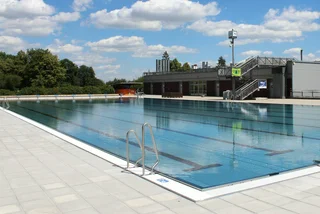Inflation is continuing to rise in the Czech Republic, and economists predict that the cost of living will get worse before it gets better. Inflation rose to 6.6 per cent in December, the highest level seen since the global financial crises of 2008. The head of the Czech National Bank has meanwhile predicted further increases in the first half of 2021 and refused to rule out the possibility than inflation will hit double digits this year.
The latest businesses now reporting difficulties with inflation are sports providers struggling to cope with precipitous increases in the price of energy. Price hikes for electricity and heating brought on by a Europe-wide energy crisis will likely see many hit with higher bills for their sporting activities.
Swimming pools are at particular risk due to their high requirement for utilities such as heating, electricity and water. Price increases for an hour’s swimming have already been reported at popular Prague pools.
“The hourly entrance fee used to be CZK 110, now people pay CZK 140,” said a cashier from the Podolí Swimming Stadium to Echo24. “This new price applies all day. Otherwise, everything remains the same, and opening hours have not changed.”
Large sports halls are also heavily affected by rises in energy prices. Lower outdoor temperatures put greater demands on indoor heating systems, resulting in spiraling operating costs during a period of high inflation. Some businesses have even suffered from the bankruptcy of their energy supplier as a result of the energy crisis, leaving them in financially disadvantageous contracts with emergency replacement suppliers.
“The situation in sports is starting to be critical. Owners and operators of sports venues do not have the means to pay for energy. There is now a risk that swimming pools, inflatable halls and other sports venues will have to close down. The state should react quickly and take real measures as soon as possible to help,” said Prague Sports Union Chair Jaroslav Chvalný.
Closures of pressurized inflatable sports halls could affect sports such as tennis, indoor volleyball and indoor football. In some cases, energy price increases have already proven a stretch too far: some operators have shut down and given customers the chance to reclaim payments.
After two years in which incomes have been slashed as a result of Covid restrictions, those sports providers still operating have little choice but to raise prices or request more support from local and national authorities.
Yet calls for aid to the National Sports Agency are so far going unanswered because the organization’s budget has not yet been confirmed by the new Czech government. The NSA said that it hopes to issue “Operation and Maintenance” subsidies once its budget is approved to keep sports venues afloat.
Until then, the hard times are continuing for sports clubs and companies up and down the country. With some closures already confirmed and many more possible, clubs, pools and other facilities will be hoping members can look past price increases to remain loyal and keep them them afloat.












 Reading time: 2 minutes
Reading time: 2 minutes 

























